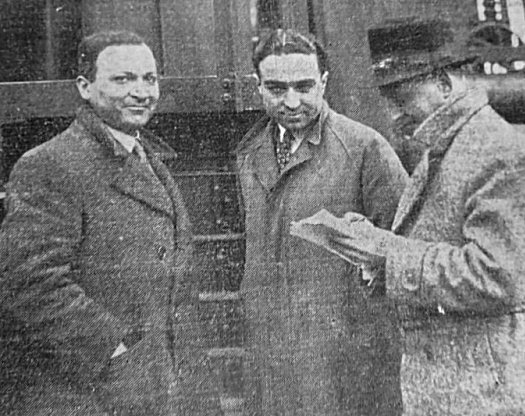Mexborough and Swinton Times March 4 , 1938
Turkish Workmen are Delighted with Wombwell

In this picture are Bey Kazim Akyel and Bey Aziz Aksu, not to mention the writer. They are from Turkey, and our reporter met them at the official starting up of the new coking plant at Mitchell Main Colliery last week. He did not know whether to call them “Mr.,” “Monsieur” or “Herr” sohe just said “Buddy.” They told him he was wrong, it was not “Buddy,” nor “Pal” either, but “Bey.” That is the form of address for every man in Turkey.
When informed that there were two Turks on the job, our reporter had visions of flowing robes and red fezes. He came across Kazim and Aziz working on the top of the ovens, and was just a little disappointed to find that they were dressed exactly like ordinary British workmen. They told him that the traditional Turkish plant-pot hat had not been worn in Turkey for twenty years or so. When Kernel Atta-turk westernised Turkey he did away with the fez, the veil, and all that sort of oriental foppery. Except that they have a foreign look about their faces they are not any different from any other workmen on the plant.
Mr. D. T. Barritt, manager of the coke-oven department of Simon Carves and Co., Ltd., explained to our representative what Kazim and Aziz were doing so many thousands of miles away from their billet. He said that Simon Carves were erecting in Turkey the first steel works plant ever established in that country. Under the terms of the contract they were obliged to employ Turkish labour on the operative jobs, and so a number of Turks had been brought over to England to learn to become skilled fitters, bricklayers, mechanics, erectors, and so on. Altogether some six or seven Turks had been employed-on the Mitchell Main contract for different periods, and on the other hand skilled workmen from England had been sent out to Turkey.
Mr. Barritt said the exchange had worked very satisfactorily. “Many of these young Turks,” he said, “are very well educated and we have been surprised-at the speed with which they have acquired skill and knowledge in the various branches. They are particularly good as bricklayers.”
Mr. Barritt said the Turks were well disposed and had chummed up with the English workers very successfully. The workmen had taken a great interest in them, and had gone to no end of trouble to teach them the language. Some of the Turks could not speak a word of English when they landed in this country. Silica brickwork is an important feature of coke-oven construction, and in this the Turks have shown particular aptitude.
In broken English Kazim Bey and Aziz Bey conversed freely with our photographer and reporter. They said they “like England.” and were very happy to be at Wombwell which, however they found very difficult to pronounce. They also recited a few sentences of Turkish, which sounded like Gunga Din backwards.